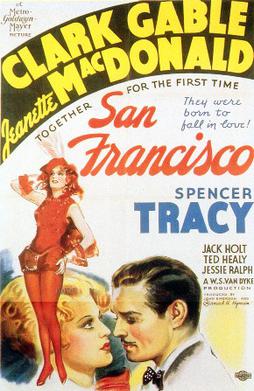
San Francisco is a 1936 American musical-drama disaster film directed by W. S. Van Dyke, based on the April 18, 1906 San Francisco earthquake. The film stars Clark Gable, Jeanette MacDonald and Spencer Tracy. MacDonald's singing helped make this film a major hit, coming on the heels of her other 1936 blockbuster, Rose Marie.

Spencer Bonaventure Tracy was an American actor. He was known for his natural performing style and versatility. One of the major stars of Hollywood's Golden Age, Tracy was the first actor to win two consecutive Academy Awards for Best Actor from nine nominations. During his career, he appeared in 75 films and developed a reputation among his peers as one of the screen's greatest actors. In 1999, the American Film Institute ranked Tracy as the 9th greatest male star of Classic Hollywood Cinema.
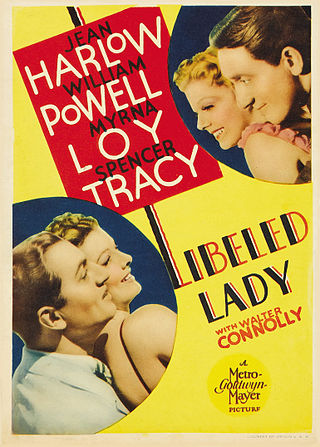
Libeled Lady is a 1936 American screwball comedy film directed by Jack Conway and starring Jean Harlow, William Powell, Myrna Loy and Spencer Tracy. It was written by George Oppenheimer, Howard Emmett Rogers, Wallace Sullivan, and Maurine Dallas Watkins. This was the fifth of fourteen films in which Powell and Loy were teamed, inspired by their success in the Thin Man series.

Test Pilot is a 1938 American drama film directed by Victor Fleming, starring Clark Gable, Myrna Loy and Spencer Tracy, and featuring Lionel Barrymore. The Oscar-nominated film tells the story of a daredevil test pilot (Gable), his wife (Loy), and his best friend (Tracy).

Fury is a 1936 American crime film directed by Fritz Lang that tells the story of an innocent man who narrowly escapes being burned to death by a lynch mob and the revenge he then seeks. The film was released by Metro-Goldwyn-Mayer and stars Sylvia Sidney and Tracy, with a supporting cast featuring Walter Abel, Bruce Cabot, Edward Ellis and Walter Brennan. Loosely based on the events surrounding the Brooke Hart murder in San Jose, California, the film was adapted by Bartlett Cormack and Lang from the story Mob Rule by Norman Krasna. Fury was Lang's first American film.

Father of the Bride is a 1950 American comedy film about a man trying to cope with preparations for his daughter's wedding starring Spencer Tracy, Joan Bennett, and Elizabeth Taylor. Directed by Vincente Minnelli, it was adapted by Frances Goodrich and Albert Hackett from the 1949 novel by Edward Streeter. Father of the Bride was nominated for Academy Awards for Best Picture, Best Writing, Screenplay, and Best Actor in a Leading Role.

Song of the Thin Man is a 1947 American murder mystery-comedy film directed by Edward Buzzell. The sixth and final film in MGM's Thin Man series, starring William Powell and Myrna Loy as Nick and Nora Charles, characters created by Dashiell Hammett. Nick Jr. is played by Dean Stockwell. Phillip Reed, Keenan Wynn, Gloria Grahame, and Jayne Meadows are featured in this story set in the world of nightclub musicians.

The Thin Man Goes Home is a 1944 American comedy mystery film directed by Richard Thorpe. It is the fifth of the six Thin Man films starring William Powell and Myrna Loy as Dashiell Hammett's dapper ex-private detective Nick Charles and his wife Nora. The supporting cast includes Lucile Watson, Gloria DeHaven and Helen Vinson. This entry in The Thin Man series was the first not directed by W.S. Van Dyke, who had died in 1943.
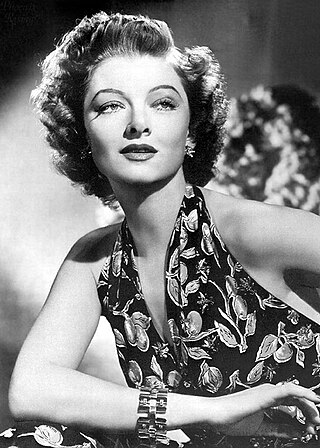
Myrna Loy was an American film, television and stage actress. As a performer, she was known for her ability to adapt to her screen partner's acting style.

Manhattan Melodrama is a 1934 American pre-Code crime film, produced by MGM, directed by W. S. Van Dyke, and starring Clark Gable, William Powell, and Myrna Loy. The movie also provided one of Mickey Rooney's earliest film roles. The film is based on a story by Arthur Caesar, who won the Academy Award for Best Original Story. It was also the first of Myrna Loy and William Powell's fourteen screen pairings.
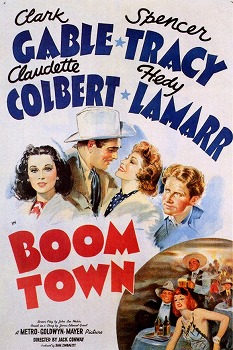
Boom Town is a 1940 American Western film starring Clark Gable, Spencer Tracy, Claudette Colbert, and Hedy Lamarr, and directed by Jack Conway. The supporting cast features Frank Morgan, Lionel Atwill, and Chill Wills. A story written by James Edward Grant in Cosmopolitan magazine entitled "A Lady Comes to Burkburnett" provided the inspiration for the film. The film was produced and released by Metro-Goldwyn-Mayer.

The Prizefighter and the Lady is a 1933 pre-Code Metro-Goldwyn-Mayer romance film starring Myrna Loy and the professional boxers Max Baer, Primo Carnera, and Jack Dempsey. The film was adapted for the screen by John Lee Mahin and John Meehan from a story by Frances Marion. Marion was nominated for an Academy Award for Best Writing, Original Story.

Hugh Ryan "Jack" Conway was an American film director and film producer, as well as an actor of many films in the first half of the 20th century.
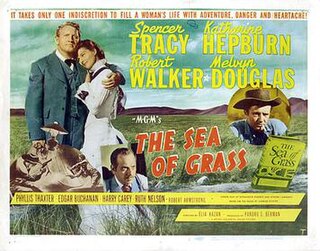
The Sea of Grass is a 1947 American Western film set in the American Southwest. It was directed by Elia Kazan and based on the 1936 novel of the same name by Conrad Richter. The film stars Katharine Hepburn, Spencer Tracy, and Melvyn Douglas.

Our Blushing Brides is a 1930 American pre-Code society comedy/romantic melodrama directed and produced by Harry Beaumont and starring Joan Crawford, Robert Montgomery, Anita Page and Dorothy Sebastian.
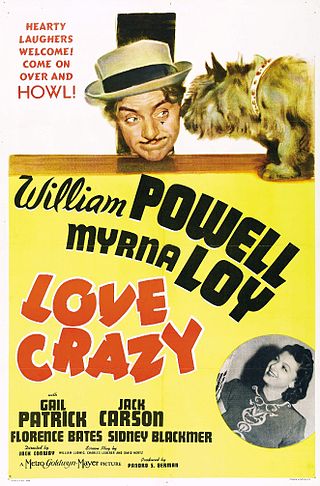
Love Crazy is a 1941 American Jack Conway screwball comedy film directed by pairing William Powell and Myrna Loy as a couple whose marriage is on the verge of being broken up by the husband's old girlfriend and the wife's disapproving mother. This was their eleventh of fourteen films appearing together. The supporting cast include Gail Patrick, Jack Carson and Sig Ruman.
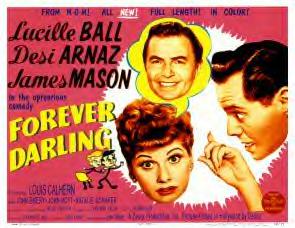
Forever, Darling is a 1956 American fantasy romantic comedy film directed by Alexander Hall, written by Helen Deutsch, and starring Lucille Ball, Desi Arnaz, and James Mason. In the film, Ball stars as a wife who tries to save her struggling marriage to a chemical engineer (Arnaz) with the help of her guardian angel (Mason). Louis Calhern and Natalie Schafer co-star in supporting roles.

Parnell is a 1937 American biographical film produced by Metro-Goldwyn-Mayer, starring Clark Gable as Charles Stewart Parnell, the famous Irish politician. It was Gable's least successful film and is generally considered his worst, and it is listed in The Fifty Worst Films of All Time. The movie addresses the sex scandal that destroyed Parnell's political career, but its treatment of the subject is highly sanitized in keeping with Hollywood content restrictions at the time.

Too Hot to Handle, also known as Let 'Em All Talk, is a 1938 comedy-drama directed by Jack Conway and starring Clark Gable, Myrna Loy, and Walter Pidgeon. The plot concerns a newsreel reporter, the female aviator he is attracted to and his fierce competitor. Many of the comedy gags were devised by an uncredited Buster Keaton.

Man-Proof is a 1938 American romantic comedy film directed by Richard Thorpe. The film is based on the 1937 novel The Four Marys written by Fannie Heaslip Lea.



















